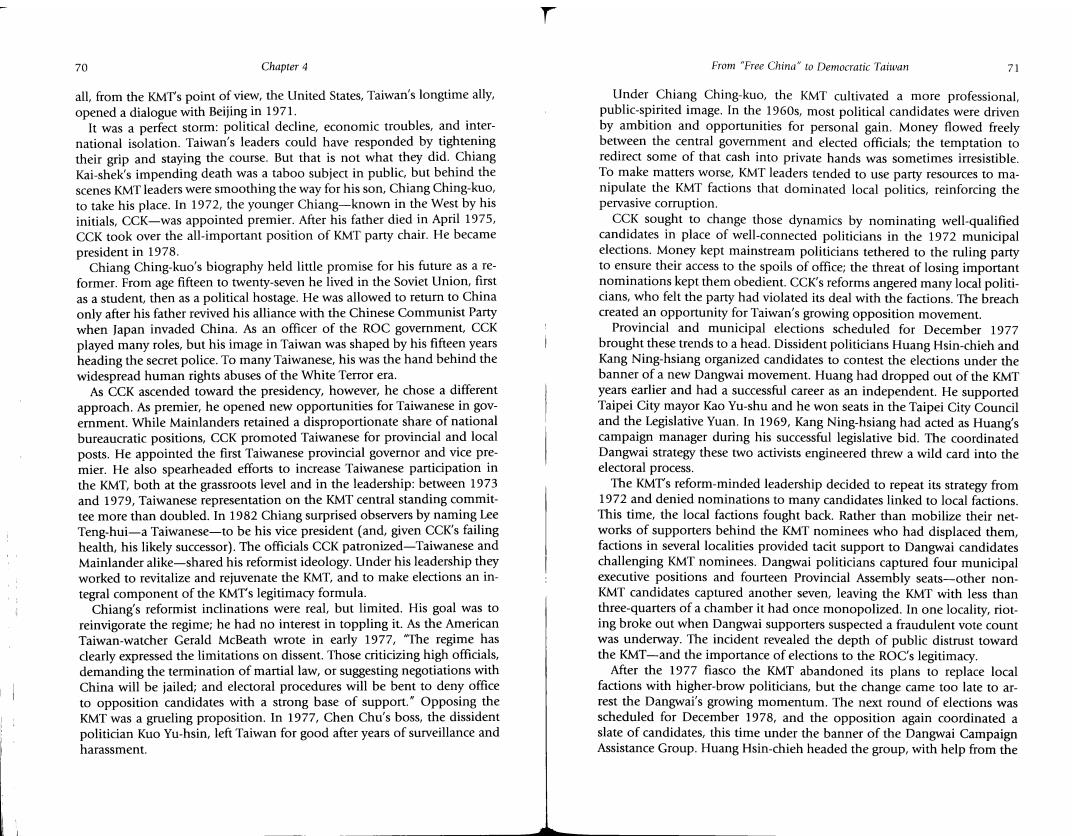
70 Chapter 4 From "Free China"to Democratic Taiwan 71 all,from the KMT's point of view,the United States,Taiwan's longtime ally, Under Chiang Ching-kuo,the KMT cultivated a more professional, opened a dialogue with Beijing in 1971 public-spirited image.In the 1960s,most political candidates were driven It was a perfect storm:political decline,economic troubles,and inter- by ambition and opportunities for personal gain.Money flowed freely national isolation.Taiwan's leaders could have responded by tightening between the central government and elected officials;the temptation to their grip and staying the course.But that is not what they did.Chiang redirect some of that cash into private hands was sometimes irresistible. Kai-shek's impending death was a taboo subject in public,but behind the To make matters worse,KMT leaders tended to use party resources to ma- scenes KMT leaders were smoothing the way for his son,Chiang Ching-kuo, nipulate the KMT factions that dominated local politics,reinforcing the to take his place.In 1972,the younger Chiang-known in the West by his pervasive corruption. initials,CCK-was appointed premier.After his father died in April 1975, CCK sought to change those dynamics by nominating well-qualified CCK took over the all-important position of KMT party chair.He became candidates in place of well-connected politicians in the 1972 municipal president in 1978. elections.Money kept mainstream politicians tethered to the ruling party Chiang Ching-kuo's biography held little promise for his future as a re- to ensure their access to the spoils of office;the threat of losing important former.From age fifteen to twenty-seven he lived in the Soviet Union,first nominations kept them obedient.CCK's reforms angered many local politi- as a student,then as a political hostage.He was allowed to return to China cians,who felt the party had violated its deal with the factions.The breach only after his father revived his alliance with the Chinese Communist Party created an opportunity for Taiwan's growing opposition movement. when Japan invaded China.As an officer of the ROC government,CCK Provincial and municipal elections scheduled for December 1977 played many roles,but his image in Taiwan was shaped by his fifteen years brought these trends to a head.Dissident politicians Huang Hsin-chieh and heading the secret police.To many Taiwanese,his was the hand behind the Kang Ning-hsiang organized candidates to contest the elections under the widespread human rights abuses of the White Terror era. banner of a new Dangwai movement.Huang had dropped out of the KMT As CCK ascended toward the presidency,however,he chose a different years earlier and had a successful career as an independent.He supported approach.As premier,he opened new opportunities for Taiwanese in gov- Taipei City mayor Kao Yu-shu and he won seats in the Taipei City Council ernment.While Mainlanders retained a disproportionate share of national and the Legislative Yuan.In 1969,Kang Ning-hsiang had acted as Huang's bureaucratic positions,CCK promoted Taiwanese for provincial and local campaign manager during his successful legislative bid.The coordinated posts.He appointed the first Taiwanese provincial governor and vice pre- Dangwai strategy these two activists engineered threw a wild card into the mier.He also spearheaded efforts to increase Taiwanese participation in electoral process. the KMT,both at the grassroots level and in the leadership:between 1973 The KMT's reform-minded leadership decided to repeat its strategy from and 1979,Taiwanese representation on the KMT central standing commit- 1972 and denied nominations to many candidates linked to local factions. tee more than doubled.In 1982 Chiang surprised observers by naming Lee This time,the local factions fought back.Rather than mobilize their net- Teng-hui-a Taiwanese-to be his vice president(and,given CCK's failing works of supporters behind the KMT nominees who had displaced them, health,his likely successor).The officials CCK patronized-Taiwanese and factions in several localities provided tacit support to Dangwai candidates Mainlander alike-shared his reformist ideology.Under his leadership they challenging KMT nominees.Dangwai politicians captured four municipal worked to revitalize and rejuvenate the KMT,and to make elections an in- executive positions and fourteen Provincial Assembly seats-other non- tegral component of the KMT's legitimacy formula. KMT candidates captured another seven,leaving the KMT with less than Chiang's reformist inclinations were real,but limited.His goal was to three-quarters of a chamber it had once monopolized.In one locality,riot- reinvigorate the regime;he had no interest in toppling it.As the American ing broke out when Dangwai supporters suspected a fraudulent vote count Taiwan-watcher Gerald McBeath wrote in early 1977,"The regime has was underway.The incident revealed the depth of public distrust toward clearly expressed the limitations on dissent.Those criticizing high officials, the KMT-and the importance of elections to the ROC's legitimacy. demanding the termination of martial law,or suggesting negotiations with After the 1977 fiasco the KMT abandoned its plans to replace local China will be jailed;and electoral procedures will be bent to deny office factions with higher-brow politicians,but the change came too late to ar- to opposition candidates with a strong base of support."Opposing the rest the Dangwai's growing momentum.The next round of elections was KMT was a grueling proposition.In 1977,Chen Chu's boss,the dissident scheduled for December 1978,and the opposition again coordinated a politician Kuo Yu-hsin,left Taiwan for good after years of surveillance and slate of candidates,this time under the banner of the Dangwai Campaign harassment. Assistance Group.Huang Hsin-chieh headed the group,with help from the
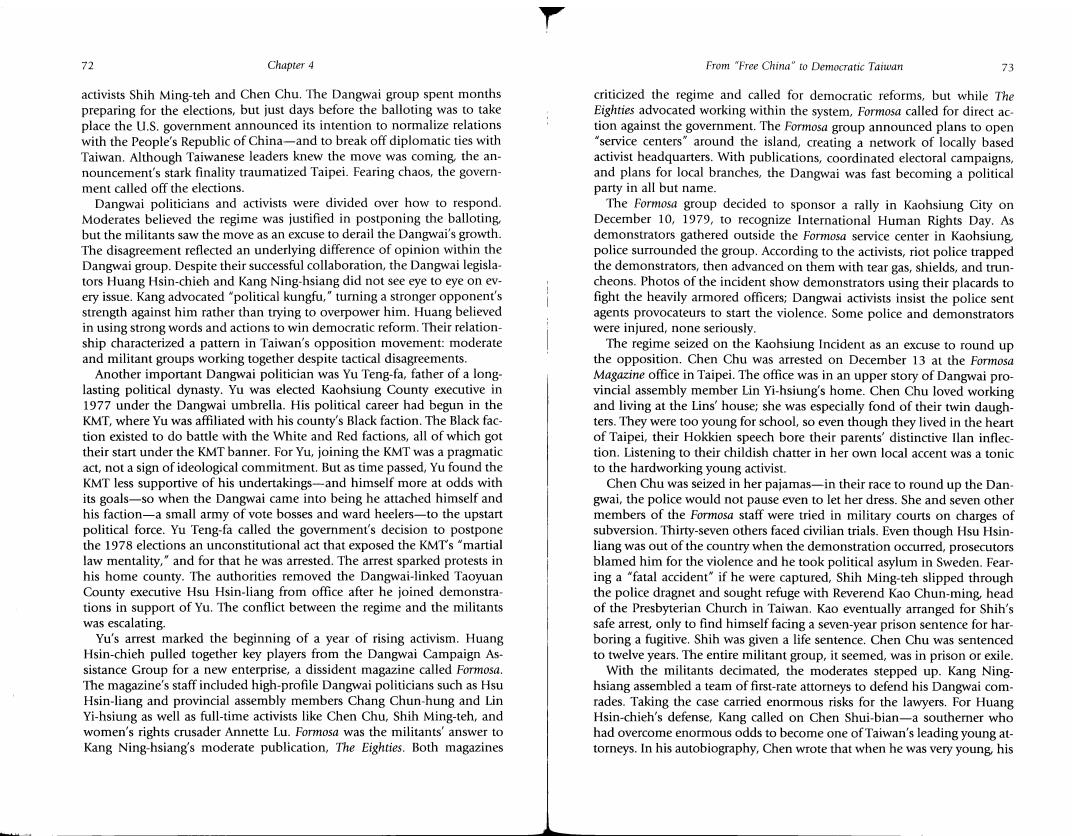
72 Chapter 4 From "Free China"to Democratic Taiwan 73 activists Shih Ming-teh and Chen Chu.The Dangwai group spent months criticized the regime and called for democratic reforms,but while The preparing for the elections,but just days before the balloting was to take Eighties advocated working within the system,Formosa called for direct ac. place the U.S.government announced its intention to normalize relations tion against the government.The Formosa group announced plans to open with the People's Republic of China-and to break off diplomatic ties with "service centers"around the island,creating a network of locally based Taiwan.Although Taiwanese leaders knew the move was coming,the an- activist headquarters.With publications,coordinated electoral campaigns, nouncement's stark finality traumatized Taipei.Fearing chaos,the govern- and plans for local branches,the Dangwai was fast becoming a political ment called off the elections. party in all but name. Dangwai politicians and activists were divided over how to respond. The Formosa group decided to sponsor a rally in Kaohsiung City on Moderates believed the regime was justified in postponing the balloting, December 10,1979,to recognize International Human Rights Day.As but the militants saw the move as an excuse to derail the Dangwai's growth. demonstrators gathered outside the Formosa service center in Kaohsiung The disagreement reflected an underlying difference of opinion within the police surrounded the group.According to the activists,riot police trapped Dangwai group.Despite their successful collaboration,the Dangwai legisla- the demonstrators,then advanced on them with tear gas,shields,and trun- tors Huang Hsin-chieh and Kang Ning-hsiang did not see eye to eye on ev- cheons.Photos of the incident show demonstrators using their placards to ery issue.Kang advocated "political kungfu,"turning a stronger opponent's fight the heavily armored officers;Dangwai activists insist the police sent strength against him rather than trying to overpower him.Huang believed agents provocateurs to start the violence.Some police and demonstrators in using strong words and actions to win democratic reform.Their relation- were injured,none seriously. ship characterized a pattern in Taiwan's opposition movement:moderate The regime seized on the Kaohsiung Incident as an excuse to round up and militant groups working together despite tactical disagreements. the opposition.Chen Chu was arrested on December 13 at the Formosa Another important Dangwai politician was Yu Teng-fa,father of a long- Magazine office in Taipei.The office was in an upper story of Dangwai pro- lasting political dynasty.Yu was elected Kaohsiung County executive in vincial assembly member Lin Yi-hsiung's home.Chen Chu loved working 1977 under the Dangwai umbrella.His political career had begun in the and living at the Lins'house;she was especially fond of their twin daugh- KMT,where Yu was affiliated with his county's Black faction.The Black fac- ters.They were too young for school,so even though they lived in the heart tion existed to do battle with the White and Red factions,all of which got of Taipei,their Hokkien speech bore their parents'distinctive llan inflec- their start under the KMT banner.For Yu,joining the KMT was a pragmatic tion.Listening to their childish chatter in her own local accent was a tonic act,not a sign of ideological commitment.But as time passed,Yu found the to the hardworking young activist. KMT less supportive of his undertakings-and himself more at odds with Chen Chu was seized in her pajamas-in their race to round up the Dan- its goals-so when the Dangwai came into being he attached himself and gwai,the police would not pause even to let her dress.She and seven other his faction-a small army of vote bosses and ward heelers-to the upstart members of the Formosa staff were tried in military courts on charges of political force.Yu Teng-fa called the government's decision to postpone subversion.Thirty-seven others faced civilian trials.Even though Hsu Hsin- the 1978 elections an unconstitutional act that exposed the KMT's "martial liang was out of the country when the demonstration occurred,prosecutors law mentality,and for that he was arrested.The arrest sparked protests in blamed him for the violence and he took political asylum in Sweden.Fear- his home county.The authorities removed the Dangwai-linked Taoyuan ing a "fatal accident"if he were captured,Shih Ming-teh slipped through County executive Hsu Hsin-liang from office after he joined demonstra- the police dragnet and sought refuge with Reverend Kao Chun-ming,head tions in support of Yu.The conflict between the regime and the militants of the Presbyterian Church in Taiwan.Kao eventually arranged for Shih's was escalating. safe arrest,only to find himself facing a seven-year prison sentence for har- Yu's arrest marked the beginning of a year of rising activism.Huang boring a fugitive.Shih was given a life sentence.Chen Chu was sentenced Hsin-chieh pulled together key players from the Dangwai Campaign As- to twelve years.The entire militant group,it seemed,was in prison or exile. sistance Group for a new enterprise,a dissident magazine called Formosa. With the militants decimated,the moderates stepped up.Kang Ning- The magazine's staff included high-profile Dangwai politicians such as Hsu hsiang assembled a team of first-rate attorneys to defend his Dangwai com- Hsin-liang and provincial assembly members Chang Chun-hung and Lin rades.Taking the case carried enormous risks for the lawyers.For Huang Yi-hsiung as well as full-time activists like Chen Chu,Shih Ming-teh,and Hsin-chieh's defense,Kang called on Chen Shui-bian-a southerner who women's rights crusader Annette Lu.Formosa was the militants'answer to had overcome enormous odds to become one of Taiwan's leading young at- Kang Ning-hsiang's moderate publication,The Eighties.Both magazines torneys.In his autobiography,Chen wrote that when he was very young,his
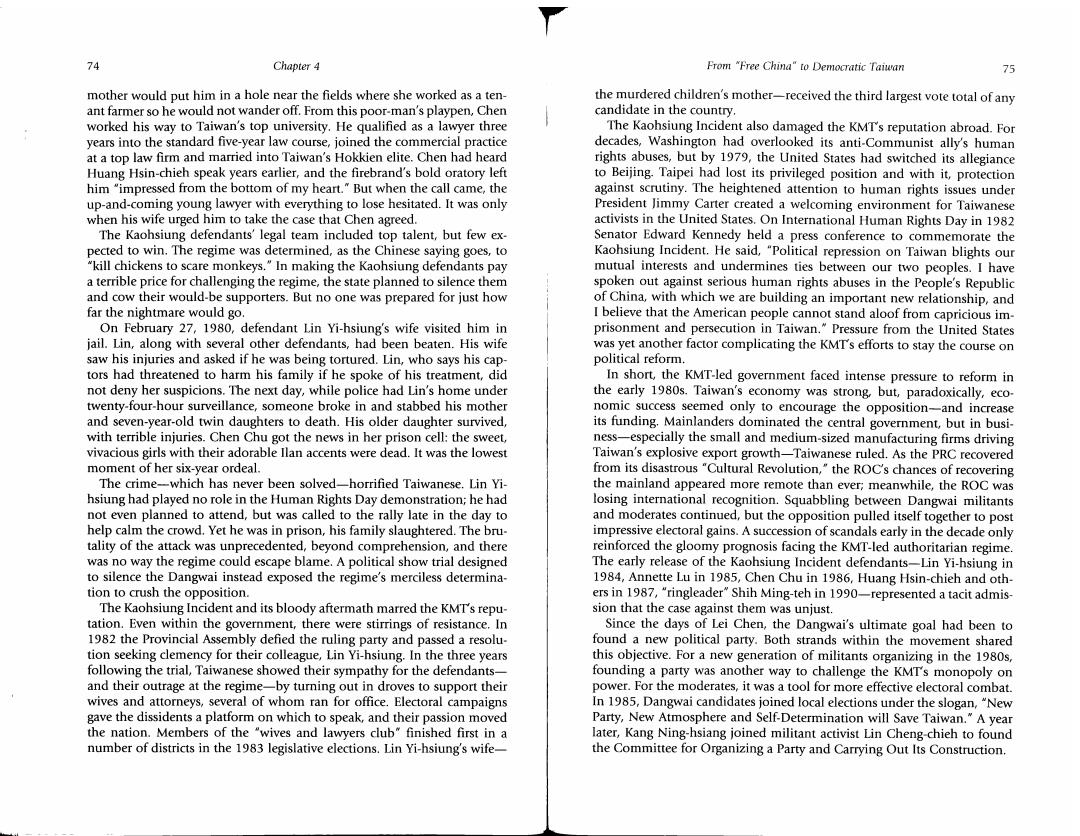
74 Chapter 4 From "Free China"to Democratic Taiwan 75 mother would put him in a hole near the fields where she worked as a ten- the murdered children's mother-received the third largest vote total of any ant farmer so he would not wander off.From this poor-man's playpen,Chen candidate in the country. worked his way to Taiwan's top university.He qualified as a lawyer three The Kaohsiung Incident also damaged the KMT's reputation abroad.For years into the standard five-year law course,joined the commercial practice decades,Washington had overlooked its anti-Communist ally's human at a top law firm and married into Taiwan's Hokkien elite.Chen had heard rights abuses,but by 1979,the United States had switched its allegiance Huang Hsin-chieh speak years earlier,and the firebrand's bold oratory left to Beijing.Taipei had lost its privileged position and with it,protection him "impressed from the bottom of my heart."But when the call came,the against scrutiny.The heightened attention to human rights issues under up-and-coming young lawyer with everything to lose hesitated.It was only President Jimmy Carter created a welcoming environment for Taiwanese when his wife urged him to take the case that Chen agreed. activists in the United States.On International Human Rights Day in 1982 The Kaohsiung defendants'legal team included top talent,but few ex- Senator Edward Kennedy held a press conference to commemorate the pected to win.The regime was determined,as the Chinese saying goes,to Kaohsiung Incident.He said,"Political repression on Taiwan blights our "kill chickens to scare monkeys."In making the Kaohsiung defendants pay mutual interests and undermines ties between our two peoples.I have a terrible price for challenging the regime,the state planned to silence them spoken out against serious human rights abuses in the People's Republic and cow their would-be supporters.But no one was prepared for just how of China,with which we are building an important new relationship,and far the nightmare would go. I believe that the American people cannot stand aloof from capricious im- On February 27,1980,defendant Lin Yi-hsiung's wife visited him in prisonment and persecution in Taiwan."Pressure from the United States jail.Lin,along with several other defendants,had been beaten.His wife was yet another factor complicating the KMT's efforts to stay the course on saw his injuries and asked if he was being tortured.Lin,who says his cap- political reform. tors had threatened to harm his family if he spoke of his treatment,did In short,the KMT-led government faced intense pressure to reform in not deny her suspicions.The next day,while police had Lin's home under the early 1980s.Taiwan's economy was strong,but,paradoxically,eco- twenty-four-hour surveillance,someone broke in and stabbed his mother nomic success seemed only to encourage the opposition-and increase and seven-year-old twin daughters to death.His older daughter survived, its funding.Mainlanders dominated the central government,but in busi- with terrible injuries.Chen Chu got the news in her prison cell:the sweet, ness-especially the small and medium-sized manufacturing firms driving vivacious girls with their adorable llan accents were dead.It was the lowest Taiwan's explosive export growth-Taiwanese ruled.As the PRC recovered moment of her six-year ordeal. from its disastrous "Cultural Revolution,"the ROC's chances of recovering The crime-which has never been solved-horrified Taiwanese.Lin Yi- the mainland appeared more remote than ever;meanwhile,the ROC was hsiung had played no role in the Human Rights Day demonstration;he had losing international recognition.Squabbling between Dangwai militants not even planned to attend,but was called to the rally late in the day to and moderates continued,but the opposition pulled itself together to post help calm the crowd.Yet he was in prison,his family slaughtered.The bru- impressive electoral gains.A succession of scandals early in the decade only tality of the attack was unprecedented,beyond comprehension,and there reinforced the gloomy prognosis facing the KMT-led authoritarian regime. was no way the regime could escape blame.A political show trial designed The early release of the Kaohsiung Incident defendants-Lin Yi-hsiung in to silence the Dangwai instead exposed the regime's merciless determina- 1984,Annette Lu in 1985,Chen Chu in 1986,Huang Hsin-chieh and oth- tion to crush the opposition. ers in 1987,"ringleader"Shih Ming-teh in 1990-represented a tacit admis- The Kaohsiung Incident and its bloody aftermath marred the KMT's repu- sion that the case against them was unjust. tation.Even within the government,there were stirrings of resistance.In Since the days of Lei Chen,the Dangwai's ultimate goal had been to 1982 the Provincial Assembly defied the ruling party and passed a resolu- found a new political party.Both strands within the movement shared tion seeking clemency for their colleague,Lin Yi-hsiung.In the three years this objective.For a new generation of militants organizing in the 1980s, following the trial,Taiwanese showed their sympathy for the defendants- founding a party was another way to challenge the KMT's monopoly on and their outrage at the regime-by turning out in droves to support their power.For the moderates,it was a tool for more effective electoral combat. wives and attorneys,several of whom ran for office.Electoral campaigns In 1985,Dangwai candidates joined local elections under the slogan,"New gave the dissidents a platform on which to speak,and their passion moved Party,New Atmosphere and Self-Determination will Save Taiwan."A year the nation.Members of the "wives and lawyers club"finished first in a later,Kang Ning-hsiang joined militant activist Lin Cheng-chieh to found number of districts in the 1983 legislative elections.Lin Yi-hsiung's wife- the Committee for Organizing a Party and Carrying Out Its Construction
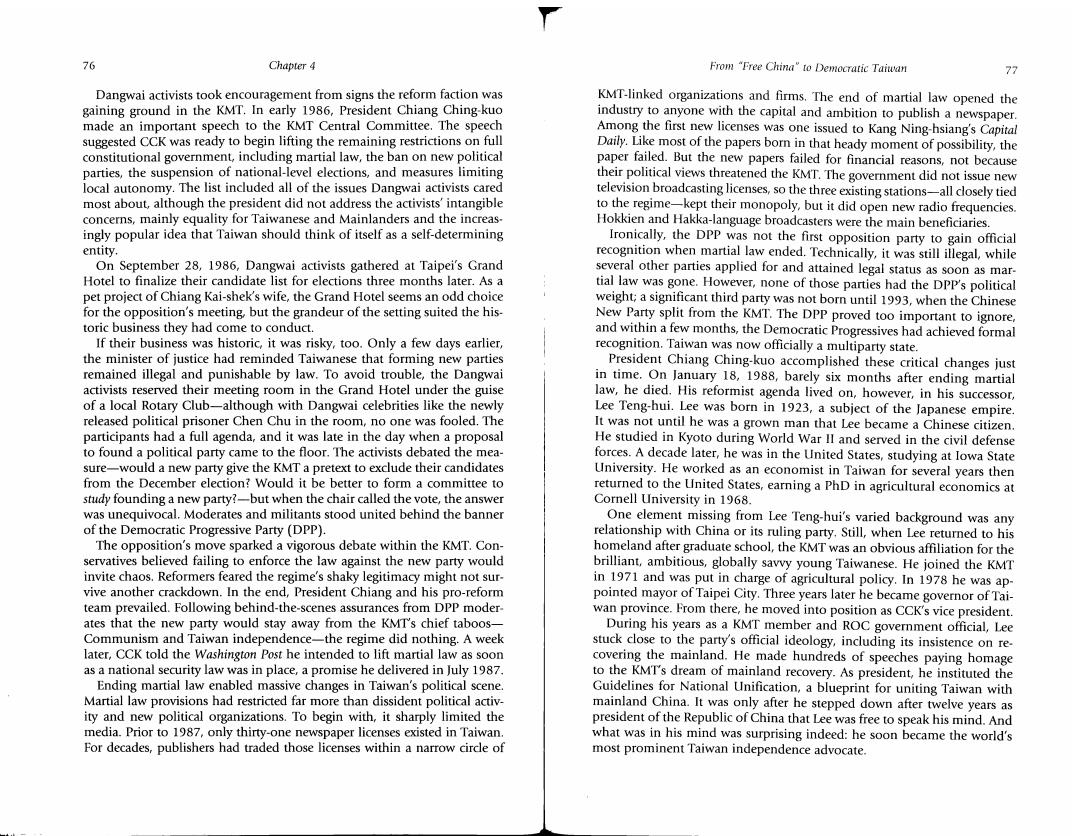
76 Chapter 4 From "Free China"to Democratic Taiwan 77 Dangwai activists took encouragement from signs the reform faction was KMT-linked organizations and firms.The end of martial law opened the gaining ground in the KMT.In early 1986,President Chiang Ching-kuo industry to anyone with the capital and ambition to publish a newspaper. made an important speech to the KMT Central Committee.The speech Among the first new licenses was one issued to Kang Ning-hsiang's Capital suggested CCK was ready to begin lifting the remaining restrictions on full Daily.Like most of the papers born in that heady moment of possibility,the constitutional government,including martial law,the ban on new political paper failed.But the new papers failed for financial reasons,not because parties,the suspension of national-level elections,and measures limiting their political views threatened the KMT.The government did not issue new local autonomy.The list included all of the issues Dangwai activists cared television broadcasting licenses,so the three existing stations-all closely tied most about,although the president did not address the activists'intangible to the regime-kept their monopoly,but it did open new radio frequencies. concerns,mainly equality for Taiwanese and Mainlanders and the increas- Hokkien and Hakka-language broadcasters were the main beneficiaries. ingly popular idea that Taiwan should think of itself as a self-determining Ironically,the DPP was not the first opposition party to gain official entity. recognition when martial law ended.Technically,it was still illegal,while On September 28,1986,Dangwai activists gathered at Taipei's Grand several other parties applied for and attained legal status as soon as mar- Hotel to finalize their candidate list for elections three months later.As a tial law was gone.However,none of those parties had the DPP's political pet project of Chiang Kai-shek's wife,the Grand Hotel seems an odd choice weight;a significant third party was not born until 1993,when the Chinese for the opposition's meeting,but the grandeur of the setting suited the his- New Party split from the KMT.The DPP proved too important to ignore, toric business they had come to conduct. and within a few months,the Democratic Progressives had achieved formal If their business was historic,it was risky,too.Only a few days earlier, recognition.Taiwan was now officially a multiparty state. the minister of justice had reminded Taiwanese that forming new parties President Chiang Ching-kuo accomplished these critical changes just remained illegal and punishable by law.To avoid trouble,the Dangwai in time.On January 18,1988,barely six months after ending martial activists reserved their meeting room in the Grand Hotel under the guise law,he died.His reformist agenda lived on,however,in his successor, of a local Rotary Club-although with Dangwai celebrities like the newly Lee Teng-hui.Lee was born in 1923,a subject of the Japanese empire. released political prisoner Chen Chu in the room,no one was fooled.The It was not until he was a grown man that Lee became a Chinese citizen. participants had a full agenda,and it was late in the day when a proposal He studied in Kyoto during World War Il and served in the civil defense to found a political party came to the floor.The activists debated the mea- forces.A decade later,he was in the United States,studying at lowa State sure-would a new party give the KMT a pretext to exclude their candidates University.He worked as an economist in Taiwan for several years then from the December election?Would it be better to form a committee to returned to the United States,earning a PhD in agricultural economics at study founding a new party?-but when the chair called the vote,the answer Cornell University in 1968. was unequivocal.Moderates and militants stood united behind the banner One element missing from Lee Teng-hui's varied background was any of the Democratic Progressive Party (DPP). relationship with China or its ruling party.Still,when Lee returned to his The opposition's move sparked a vigorous debate within the KMT.Con- homeland after graduate school,the KMT was an obvious affiliation for the servatives believed failing to enforce the law against the new party would brilliant,ambitious,globally savvy young Taiwanese.He joined the KMT invite chaos.Reformers feared the regime's shaky legitimacy might not sur- in 1971 and was put in charge of agricultural policy.In 1978 he was ap- vive another crackdown.In the end,President Chiang and his pro-reform pointed mayor of Taipei City.Three years later he became governor of Tai- team prevailed.Following behind-the-scenes assurances from DPP moder- wan province.From there,he moved into position as CCK's vice president. ates that the new party would stay away from the KMT's chief taboos- During his years as a KMT member and ROC government official,Lee Communism and Taiwan independence-the regime did nothing.A week stuck close to the party's official ideology,including its insistence on re- later,CCK told the Washington Post he intended to lift martial law as soon covering the mainland.He made hundreds of speeches paying homage as a national security law was in place,a promise he delivered in July 1987. to the KMT's dream of mainland recovery.As president,he instituted the Ending martial law enabled massive changes in Taiwan's political scene. Guidelines for National Unification,a blueprint for uniting Taiwan with Martial law provisions had restricted far more than dissident political activ- mainland China.It was only after he stepped down after twelve years as ity and new political organizations.To begin with,it sharply limited the president of the Republic of China that Lee was free to speak his mind.And media.Prior to 1987,only thirty-one newspaper licenses existed in Taiwan. what was in his mind was surprising indeed:he soon became the world's For decades,publishers had traded those licenses within a narrow circle of most prominent Taiwan independence advocate
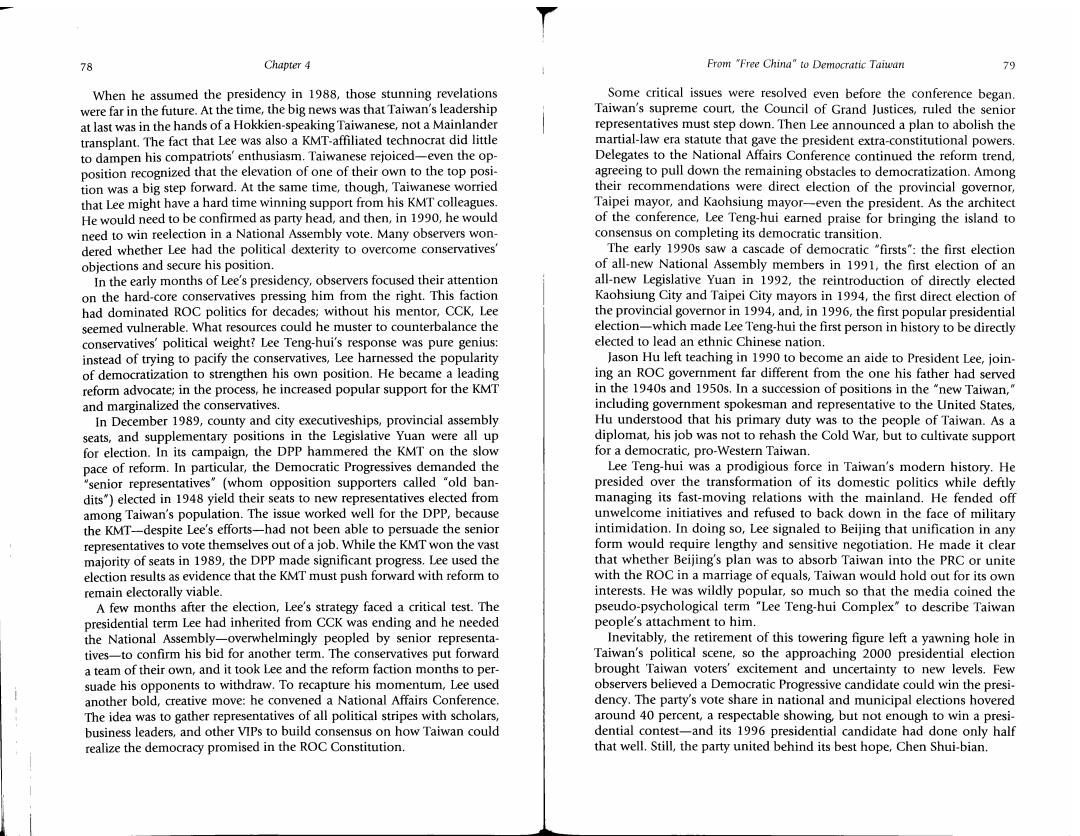
78 Chapter 4 From "Free China"to Democratic Taiwan 79 When he assumed the presidency in 1988,those stunning revelations Some critical issues were resolved even before the conference began. were far in the future.At the time,the big news was that Taiwan's leadership Taiwan's supreme court,the Council of Grand Justices,ruled the senior at last was in the hands of a Hokkien-speaking Taiwanese,not a Mainlander representatives must step down.Then Lee announced a plan to abolish the transplant.The fact that Lee was also a KMT-affiliated technocrat did little martial-law era statute that gave the president extra-constitutional powers. to dampen his compatriots'enthusiasm.Taiwanese rejoiced-even the op- Delegates to the National Affairs Conference continued the reform trend, position recognized that the elevation of one of their own to the top posi- agreeing to pull down the remaining obstacles to democratization.Among tion was a big step forward.At the same time,though,Taiwanese worried their recommendations were direct election of the provincial governor, that Lee might have a hard time winning support from his KMT colleagues. Taipei mayor,and Kaohsiung mayor-even the president.As the architect He would need to be confirmed as party head,and then,in 1990,he would of the conference,Lee Teng-hui earned praise for bringing the island to need to win reelection in a National Assembly vote.Many observers won- consensus on completing its democratic transition. dered whether Lee had the political dexterity to overcome conservatives' The early 1990s saw a cascade of democratic "firsts":the first election objections and secure his position. of all-new National Assembly members in 1991,the first election of an In the early months of Lee's presidency,observers focused their attention all-new Legislative Yuan in 1992,the reintroduction of directly elected on the hard-core conservatives pressing him from the right.This faction Kaohsiung City and Taipei City mayors in 1994,the first direct election of had dominated ROC politics for decades;without his mentor,CCK,Lee the provincial governor in 1994,and,in 1996,the first popular presidential seemed vulnerable.What resources could he muster to counterbalance the election-which made Lee Teng-hui the first person in history to be directly conservatives'political weight?Lee Teng-hui's response was pure genius: elected to lead an ethnic Chinese nation. instead of trying to pacify the conservatives,Lee harnessed the popularity Jason Hu left teaching in 1990 to become an aide to President Lee,join- of democratization to strengthen his own position.He became a leading ing an ROC government far different from the one his father had served reform advocate;in the process,he increased popular support for the KMT in the 1940s and 1950s.In a succession of positions in the "new Taiwan," and marginalized the conservatives. including government spokesman and representative to the United States, In December 1989,county and city executiveships,provincial assembly Hu understood that his primary duty was to the people of Taiwan.As a seats,and supplementary positions in the Legislative Yuan were all up diplomat,his job was not to rehash the Cold War,but to cultivate support for election.In its campaign,the DPP hammered the KMT on the slow for a democratic,pro-Western Taiwan. pace of reform.In particular,the Democratic Progressives demanded the Lee Teng-hui was a prodigious force in Taiwan's modern history.He "senior representatives"(whom opposition supporters called "old ban- presided over the transformation of its domestic politics while deftly dits")elected in 1948 yield their seats to new representatives elected from managing its fast-moving relations with the mainland.He fended off among Taiwan's population.The issue worked well for the DPP,because unwelcome initiatives and refused to back down in the face of military the KMT-despite Lee's efforts-had not been able to persuade the senior intimidation.In doing so,Lee signaled to Beijing that unification in any representatives to vote themselves out of a job.While the KMT won the vast form would require lengthy and sensitive negotiation.He made it clear majority of seats in 1989,the DPP made significant progress.Lee used the that whether Beijing's plan was to absorb Taiwan into the PRC or unite election results as evidence that the KMT must push forward with reform to with the ROC in a marriage of equals,Taiwan would hold out for its own remain electorally viable. interests.He was wildly popular,so much so that the media coined the A few months after the election,Lee's strategy faced a critical test.The pseudo-psychological term "Lee Teng-hui Complex"to describe Taiwan presidential term Lee had inherited from CCK was ending and he needed people's attachment to him. the National Assembly-overwhelmingly peopled by senior representa- Inevitably,the retirement of this towering figure left a yawning hole in tives-to confirm his bid for another term.The conservatives put forward Taiwan's political scene,so the approaching 2000 presidential election a team of their own,and it took Lee and the reform faction months to per- brought Taiwan voters'excitement and uncertainty to new levels.Few suade his opponents to withdraw.To recapture his momentum,Lee used observers believed a Democratic Progressive candidate could win the presi- another bold,creative move:he convened a National Affairs Conference. dency.The party's vote share in national and municipal elections hovered The idea was to gather representatives of all political stripes with scholars, around 40 percent,a respectable showing,but not enough to win a presi- business leaders,and other VIPs to build consensus on how Taiwan could dential contest-and its 1996 presidential candidate had done only half realize the democracy promised in the ROC Constitution. that well.Still,the party united behind its best hope,Chen Shui-bian